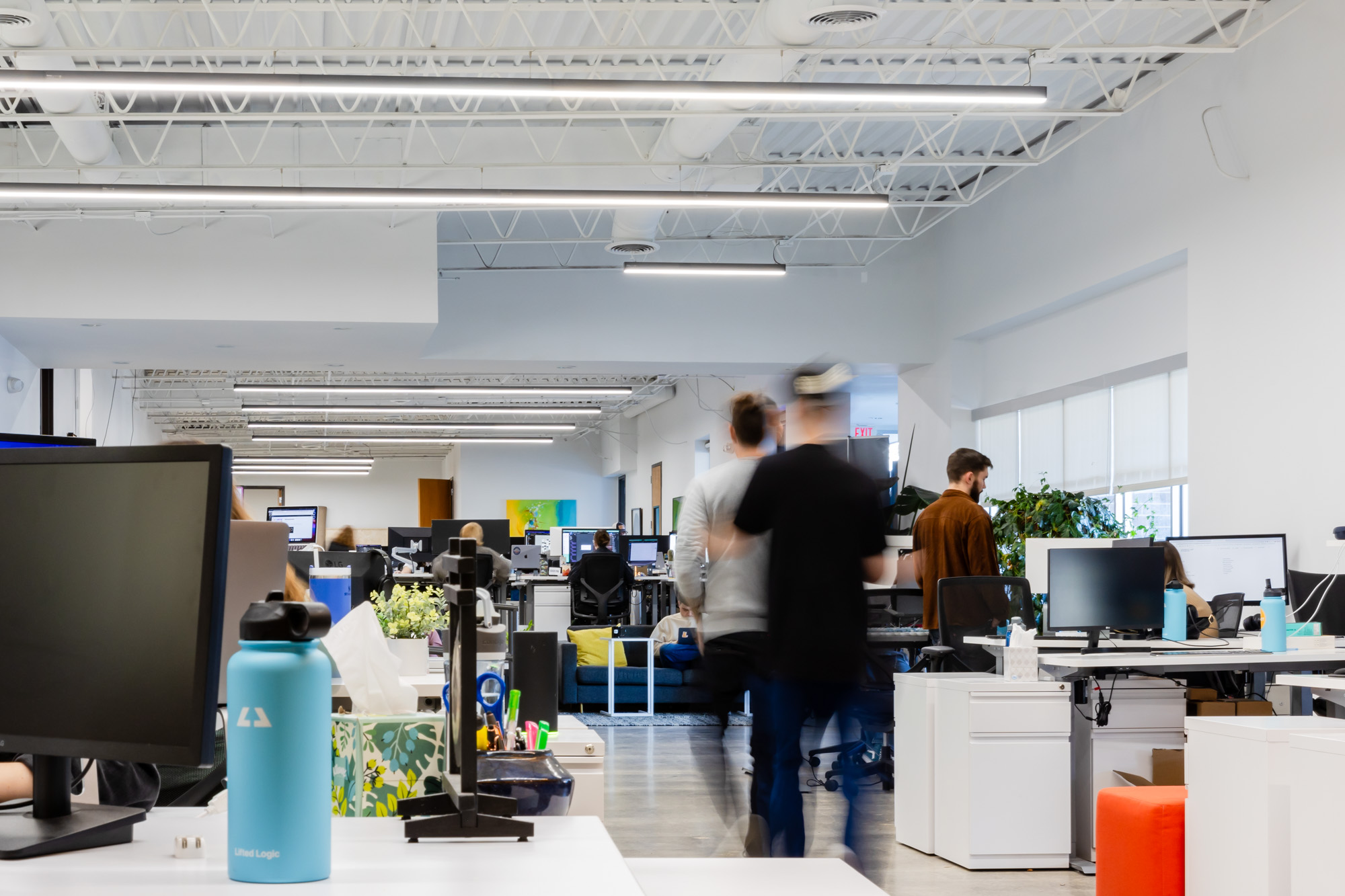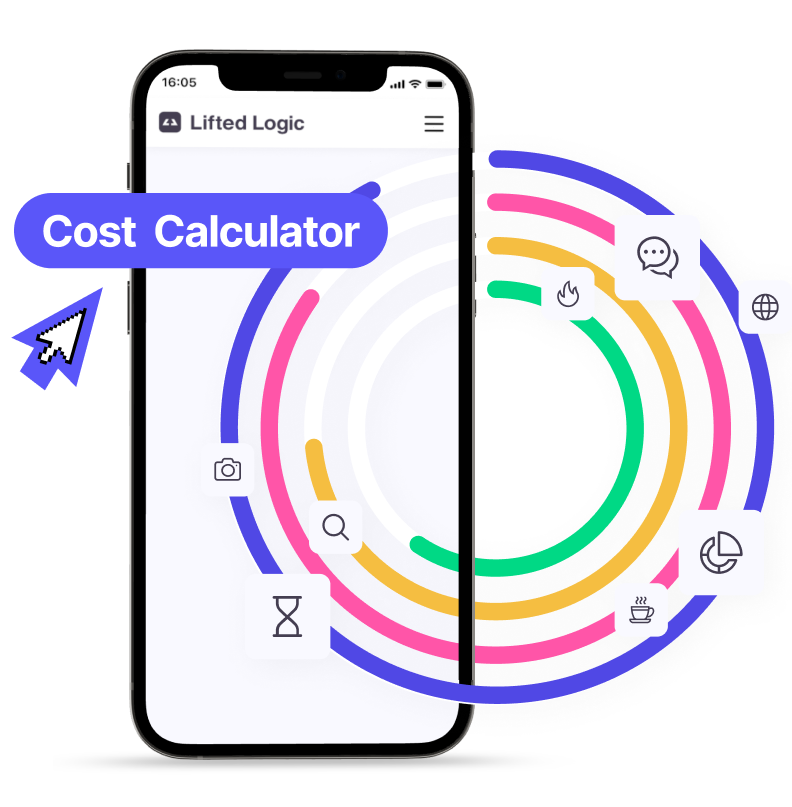Lifted Logic loves educating our fellow small business owners and other online entrepreneurs on what SEO is, how it works, and how you can use it as a tool to grow your business.
So how do you navigate the world wide web as a small business in 2019? What kind of SEO techniques should you be utilizing? There are a ton of different ways of looking at SEO. We even like to say that Most SEO Companies Are Like Diets.
So where do you start?
Our theory is, let’s learn to walk before we try running. By nailing down SEO content essentials first, you’re setting up your business, and your online presence, for huge growth and success.
And that means starting local.
What is local SEO?
There are two different kinds of SEO: local and national. Depending on what you type into a search engine, you could be presented with two different sets of results.
Are you looking for “web design”? Or “web design in Kansas City”?
The difference between local and national SEO is in the intent.
The phrase “web design” may turn up results such as web design templates, how-to articles from industry leaders, or classes in web design across the country.
The phrase “web design in Kansas City” will give you much different results. This is because Google recognizes that the intent of your search is to find a business or services in your area.
Try it out for yourself and see how different these results can be!
Why local SEO?
Google and other search engines are focusing more than ever on a user’s intent in typing in a search phrase.
This past fall, Google reported that at least 46% of searches now contain “local intent” – the user intends on finding a result that is both relevant to their question and their geographic area.
Local search has one of the highest conversion levels of all marketing channels. It provides a way for users actively searching for these services to find you (versus serving them ads that they consume passively in their everyday life). It’s also one of the most measurable marketing avenues available.
Most small and medium businesses have neither the domain authority nor the need to rank on a national scale, unless they somehow garner a ridiculous amount of direct traffic and can push it up to the second or third page of results.
That means that the majority of the time, the blog posts you write should be focused on local SEO.
Working in the realm of local SEO means you’re only competing with other local businesses in SERPs… not the entire world.
It’s a lot more attainable, and effective, to target for local SEO, especially if your business does not ship nationally or promote your products/services to customers outside of your area.
What does local SEO look like?
If you’re optimizing a blog post and would like it to rank in your local area, be sure to include relevant content for that area in the text (and possibly images or videos, if applicable) in your post.
For example, rather than trying to write an article for “best plant nursery” you may want to “localize” your post and title by adding “in Kansas City.”
In your content, you can (and should!) also:
- Optimize your content to include the entire keyphrase “best plant nursery in Kansas City”
- Mention other local businesses, and include links to their site
- Use street names/cross streets (“We’re located in Kansas City off I-35.”)
- Bring up specific neighborhoods, districts, and/or landmarks (and include links when possible!)
- Optimize content for the county name or other small neighborhoods separately (the content for “web design in Kansas City” should be a different post than the content for “web design in Johnson County”)
- Use local acronyms (KC, STL, ATL, etc.) and other slang
- Sparingly include words like “local” and “community”
- After an initial introduction, write in first person to help humanize the content (“We offer web design in Kansas City” versus “Lifted Logic offers web design in Kansas City”)
- Write specific content based on community events
You can also boost your local SEO outside of content creation. Optimizing your Google My Business listing is one of the best things you can do for your business in 2019!
Additionally, you can also spend time on:
- URL Structure
- Schema
- Meta Titles & Descriptions
- Internal Linking
- Building Reviews on Google
Overall, local SEO is ripe with opportunities for your business to organically reach customers. Take advantage of as many of these avenues as possible and watch your website flourish!
SERPs & Backlinks
When determining whether or not to show your website in search results, search engines like Google, Bing, and Yahoo don’t just look at YOUR website; they also look at other websites that link to you.
This helps them not only determine how relevant you are in your industry/space, but also supplies even more indicators to determine what your website is about. It can also tell the search engine how relevant you are to your local community, or if you operate on a larger scale.
Gaining backlinks isn’t always easy. Luckily, we’ve got some tips to help you improve your domain authority, gain backlinks, and improve your local SEO.
How to earn backlinks from other websites
Here are a few ideas to get you started earning backlinks from other reputable websites in your area to help you improve your local SEO & authority.
Guest Blogging
If there are any popular bloggers in your area, invite them to write a guest blog on your website. Most would jump at the chance to self-promote and it will not only help you curate more relevant content, but chances are that this blogger would also link to this post on their own site and social.
On the flip side, you can also offer to provide guest blog posts to other local websites. You can use the authority you’ve built in your space to provide expert advice or knowledge about a subject that’s relevant to your business or services. Then be sure to include a link back to your site at the end (or throughout) the article!
Leveraging Local News Outlets
Sharing links to local news articles or features on your website’s blog will help indicate to a search engine what kind of involvement you have in your community.
Additionally, you can capitalize on the news website’s authority by commenting on relevant articles about your business. Be sure to include the business name AND a link, if possible.
Posting to Forums
Try posting to your city’s subreddit and include links to your site. If there are any other popular local bloggers that allow open commenting and are relevant to your industry, be sure to engage with them too!
Beware of this method; it can start feeling spammy VERY quickly. Keep your approach helpful and informative, rather than a sales pitch.
Say we own a plant nursery here in KC. We could comment on your blog post about gardening and say “Hey! Nice post. Did you know Lifted Logic sells seeds all year long? <link>” we would most likely get that comment deleted or flagged pretty quickly. It’s disingenuous and clearly sounds like a sales pitch.
However, if we take a different approach, we appear more helpful and passionate about spreading our knowledge:
“I personally prefer perennials because my garden needs a lot less maintenance that way! I actually just wrote a blog about it if you’re interested in hearing another perspective. Our plant nursery is pretty popular in KC and a lot of our customers agree with you. We love answering questions and being a local gardening resource, so if anyone has any questions or wants to know how to get started, feel free to PM me! < link>”
(Note the use of first person in the second example to seem more human and less corporate.)
Social-Social-Social
Yes, social media counts toward your link profile! Share your relevant page links in local Facebook groups, a link to your homepage in your Instagram bio, and/or new blog links on Twitter and LinkedIN.
Dlvr.it is one software we use for syncing a blog feed directly to social media feeds, so anytime a new blog is posted, it’s automatically pushed out to social!
Sponsor & Attend Local Events
Getting your brand out into the community will help you garner social media mentions from other attendees and help you network with other small businesses. Create your “tribe” of support and work on exchanging links like business cards!
You can find more helpful hints and tricks over at FatJoe’s blog, where they’ve got a great, in-depth guide to Local SEO.
Learn More
Lifted Logic provides SEO Blogging services to clients across the country to help improve their local SEO and give their customers a chance to learn more about their industry and services.
How is your website currently performing? We offer a free 1-hour website review in which we will help educate you on all-things SEO.





